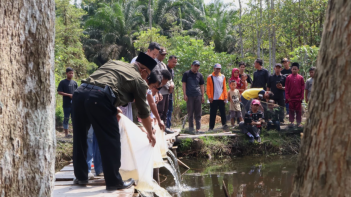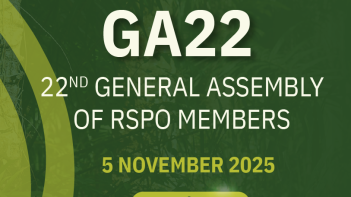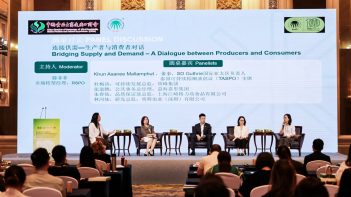When the RSPO standards were agreed in 2007, it was decided that it would be reviewed within 5 years. The Executive Board of the RSPO believes that the Principles & Criteria remain relevant and needed but they can be made more effective. This document outlines how stakeholders will be able to contribute to this review.
Phase 1 Review of the Generic Principles and Criteria of the RSPO:
P&C Review Steering Group – December 2011
Background:
When the RSPO standards (Principles & Criteria) were agreed in 2007 it was decided that they would be reviewed within 5 years. This document outlines how stakeholders will be able to contribute to this review. The review of the Generic Principles & Criteria of the RSPO requires the following:
1. The RSPO requires that there is a review of the:
- Generic P&C document (the Definition of sustainable palm oil and the Principles, Criteria, Indicators and Guidance) and that this review should be completed by November 2012.
- The review should incorporate Principles, Criteria, Indicators and Guidance relating to GHGs and alternatives to the use pesticides – both of these are issues that have been addressed by work already underway.
- The proposed changes to the Generic document will be voted on by the General Assembly in 2012
In addition the RSPO has decided to follow ISEAL best practice guidance in reviewing its standards:
2. ISEAL recommends that a review looks at the:
- Continued relevance of the P&Cs
- Effectiveness of the P&Cs in meeting their stated objectives
The Executive Board of the RSPO believes that “The Principles & Criteria remain relevant and needed but they can be made more effective.”
Having been put into practice since 2007 there is now a lot of experience of what works and what does not work. This has come from individual members, from the working groups and taskforces of the RSPO, from certification bodies and from the RSPO secretariat. The experience needs to be drawn on to make the P&Cs more effective.
The RSPO is keen to allow stakeholders freedom to question the larger issues of the P&Cs but wants stakeholders to be aware that whilst this is an opportunity to substantially change the P&Cs this will only happen if consensus is reached.
The Executive Board of the RSPO has established a Principle & Criteria Review Steering Group made up of:
- Adam Harrison, WWF International – Chair of the Standards & Certification Steering Committee (P&CR Chair);
- Jan Kees Vis – Chair of the Claims & Communications Steering Committee;
- Hidde van Kersen, IOI-Loders Croklaan – Chair of the Trade & Traceability Steering Committee;
- Edi Suhardi – Indonesian Grower representative on the EB;
- Puvan Selvanathan – Malaysian Grower representative on the EB;
- Darrel Webber, RSPO Secretary General;
- Salahudin Yaacob, RSPO Technical Director.
This Steering Group has decided to split the review into two parts.
Phase 1 – reviewing the continuing relevance of the Generic P&Cs:
Phase 1 will be a pre-consultation review of the continuing relevance of the P&Cs which will run at least to the end of January 2012. This will give all stakeholders the opportunity to pose some of the more open, fundamental or cross-cutting questions about the P&Cs and to make suggestions for how they could be made more relevant to sustainability in palm oil. It will be supplemented with a process of commissioning thought pieces from external parties (academics, friends and critics of the RSPO) and drawing together the knowledge and recommendations from the various working groups and task forces of the RSPO over the years.
Phase 1 will end with the P&C Review steering group drawing together the conclusions, lessons or suggestions from the process and feeding them into the next phase.
Phase 2 – improving the effectiveness of the Generic P&Cs:
A more tightly focussed review process to look at the effectiveness of the current P&Cs will run from February 2012 and be conducted largely by the P&C Review Task Force established with balanced representation of all RSPO members and drawing on external experts. Drawing on the results of Phase 1 the TF will look at the content of the Generic P&Cs and whether they need to be re-drafted.
Specific requests to stakeholders to input into Phase 1 of the review:
Stakeholders are asked to submit, by 31st January 2012, short, written comments addressing the question:
What is the continuing relevance of the RSPO’s Generic Principle & Criteria to delivering sustainable palm oil?
The following questions might help structure your submissions:
- Is the definition of sustainable palm oil in the document still relevant?
- What is the nature and scale of the sustainability challenges facing palm oil now?
- Are the challenges different, better or worse than when the P&Cs were developed?
- Can a voluntary business standard address those issues?
- Alone?
- Alongside other initiatives and efforts?
- What are the top 5 sustainability issues facing palm oil?
- What are the suggestions for how the P&Cs could address them?
- What are the main challenges to the sustainability of palm oil production that the P&Cs should address:
- Zero deforestation
- GHG emission and climate change
- Peat and Peatlands
- Pesticides
- Landscape level impacts
- Water
- Soils
- New plantings and expansion
- Any other
- What suggestions do you have for how these could be addressed in general?
- What are the main challenges to the sustainability of palm oil beyond the producers:
- Is there a need for P&Cs for downstream and upstream members?
- How can the RSPO expand membership?
- Any other
- What other changes are needed in the RSPO to address the sustainability challenges to palm oil?
- How can the RSPO monitor and evaluate the impacts of certification?
- How can the RSPO best enforce the P&Cs?
- How can the RSPO best ensure that smallholders seek certification?
- Other issues?
- The wider strengths and weaknesses, opportunities and threats to the P&Cs:
- Amongst Government policies in both producer and consumer regions – what needs to change to better deliver sustainable palm oil?
- What practices within the whole palm oil supply chain from finance to retailers would better support sustainable palm oil?
Respondents do not need to reply to all these questions – and can indeed pose and answer any other questions if they help the RSPO answer the question of whether the current principles & criteria are relevant to delivering sustainable palm oil.
There have been several working groups of the RSPO established over the last years that have addressed many of the specific issues above. For instance separate working groups on GHGs and new plantings have developed detailed improvements to make the P&Cs more effective in these areas. An indication of these can be got from the RSPO website (www.rspo.org). The opportunity at this point is for any interested party to raise new issues, or new approaches that have not yet been addressed by the RSPO.
Submissions will be considered by the P&C Review Steering Group for possible further action in 2012 as part of the work of the P&C Review Task Force or other groups within the RSPO.
**Please send your submissions to: ([email protected]) by January 31, 2012
| Attachment | Size |
|---|---|
| Phase1P&CReview-1.pdf | 127.03 KB |
Keep reading

Rowo Ombo: From Neglected Swamp to a Symbol of Hope and Conservation in Jambi, Indonesia

Save the Date: The 22nd General Assembly (GA22) of RSPO Members

Access into prisma

10 Years of RSPO in China: Driving Palm Oil Transformation Towards Sustainability

Updated Trace Function in prisma

Call for Expression of Interest: Independent Investigation of a Complaint

Latin American Smallholders, Key Global Brands Gather in Peruvian Amazon to Advance Sustainable Palm Oil

RSPO Forum for Members and Certification Bodies 2025: Strengthening Capacities and Building Bridges with RSPO Members




